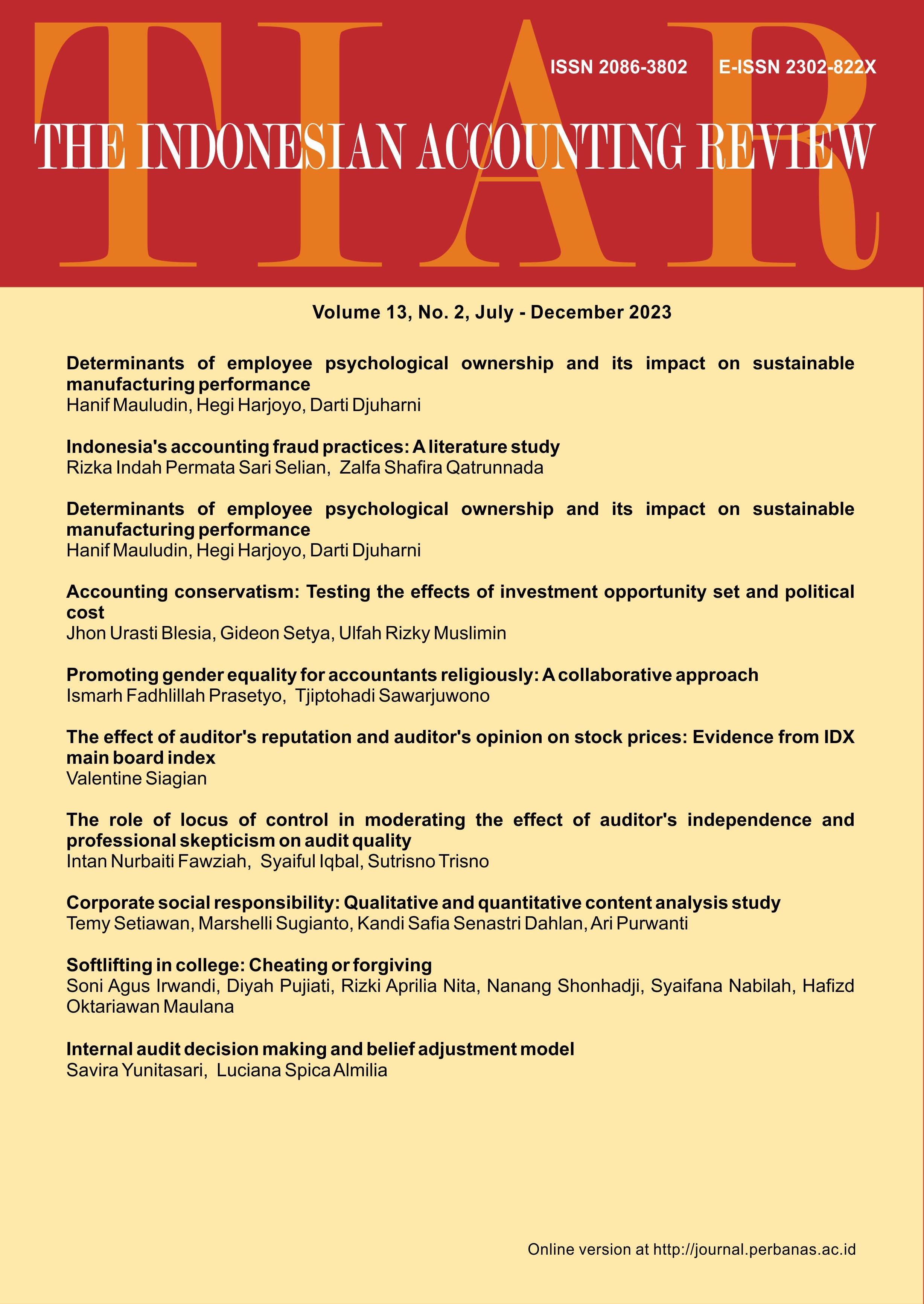Softlifting in College: Cheating or Forgiving
DOI:
https://doi.org/10.14414/tiar.v13i2.3597Keywords:
Fraud, Ethics softlifting, Sensitivity, Moral ethics, Perceived risk, Perceived benefitsAbstract
Softlifting in higher education occurs due to the academic community's requirements and the convenience of accessing and downloading software through internet platforms. This research aims to investigate the impact of ethics sensitivity, moral ethics, perceived risk, perceived benefits, and habit on the intention to engage in softlifting. The study employed quantitative research through distributing questionnaires to accounting students at private universities in Surabaya. Data analysis was conducted using Structural Equation Model Partial Least Square (SEM-PLS). The findings reveal that ethics sensitivity, moral ethics, perceived risk, and habit have a negative and significant influence on the intention to engage in softlifting. On the other hand, perceived benefits have a positive and significant effect on softlifting intention. Incorporating ethical and moral values as research variables is an essential ethical consideration for those involved in software piracy, which adds originality to this study. This research emphasizes the importance of effective socialization and education against using pirated software or engaging in softlifting within the university environment. Furthermore, it underscores the responsibility of university management to provide legal software to students, which serves as a practical contribution to the overall issue.
References
Ajzen, I. (1991). The Theory of Planned Behavior. Organizational Behavior and Human Decision Processes, 50 (2), 179-211. DOI: 10.1016/0749-5978(91)90020-T.
Atmadjaja, A. H. (2018). Pengaruh Moral Equity, Relativism, dan Sikap Individu terhadap Perilaku Pembajakan Produk Digital di Surabaya. CALYPTRA, 7(1), 1311-1327.
Ahyaruddin, M., & Asnawi, M. (2017). Pengaruh moral reasoning dan ethical environment terhadap kecenderungan untuk melakukan whistleblowing. Jurnal Akuntansi dan ekonomika, 7(1), 1-20.
Brabeck, M. (1984). Ethical characteristics of whistle blowers. Journal of Research in Personality, 18(1), 41-53.
Brooks, L. J., & Dunn, P. (2020). Business and professional ethics: Cengage Learning.
Carbaugh, R., & Ghosh, K. (2005). Are college textbooks priced fairly? Challenge, 48(5), 95-112.
Casidy, R., Lwin, M., & Phau, I. (2017). Investigating the role of religiosity as a deterrent against digital piracy. Marketing Intelligence & Planning.
Choi, D. L., & Perry, J. L. (2010). Developing a tool to measure ethical sensitivity in public administration and its application. International Review of Public Administration, 14(3), 1-12..
Chowdhury, R. M. (2018). Religious orientations and consumer ethics: The mediating role of personal moral philosophies. Journal of Macromarketing, 38(3), 315-330.
Cordell, V. V., Wongtada, N., & Kieschnick Jr, R. L. (1996). Counterfeit purchase intentions: role of lawfulness attitudes and product traits as determinants. Journal of Business Research, 35(1), 41-53.
Duska, R. F., Duska, B. S., & Kury, K. W. (2018). Accounting ethics: John Wiley & Sons.
Fishbein, M., & Ajzen, I. (1977). Belief, attitude, intention, and behavior: An introduction to theory and research. Philosophy and Rhetoric, 10(2).
Fornell, C. & Larcker, D. F. (1981). Evaluating Struc-tural Equation Models with Unobservable Vari-ables and Measurement Error. Journal of Mar-keting Research, vol. XVIII, no. February, pp. 39-50.
Forsyth, D. R. (1981). Moral judgment: The influence of ethical ideology. Personality and Social Psychology Bulletin, 7(2), 218-223.
Gholami, K., Kuusisto, E., & Tirri, K. (2015). Is Ethi-cal Sensitivity in Teaching Culturally Bound? Comparing Finnish and Iranian Teachers’ Ethi-cal Sensitivity, Compare. A Journal of Compara-tive and International Education, 45 (6), 886-907, DOI: 10.1080/03057925.2014.984588.
Ghozali, I., & Latan, H. (2015). Partial least squares konsep, teknik dan aplikasi menggunakan program smartpls 3.0 untuk penelitian empiris. Semarang: Badan Penerbit UNDIP.
Goles, T., Jayatilaka, B., George, B., Parsons, L., Chambers, V., Taylor, D., & Brune, R. (2008). Softlifting: Exploring determinants of attitude. Journal of business ethics, 77(4), 481-499.
Greene, J. D., Nystrom, L. E., Engell, A. D., Darley, J. M., & Cohen, J. D. (2004). The neural bases of cognitive conflict and control in moral judgment. Neuron, 44(2), 389-400.
Hati, S. R. H., Fitriasih, R., & Safira, A. (2019). E-textbook piracy behavior: An integration of ethics theory, deterrence theory, and theory of planned behavior. Journal of Information, Communication and Ethics in Society.
Herjanto, H., Gaur, S., & Hong, J. H. H. (2017). Factors influencing consumers’ purchase intention of genuine products and intention to use pirated products: Malaysian perspective. Paper presented at the International Conference on Management and Entrepreneurship (I-Come).
Holsapple, C. W., Iyengar, D., Jin, H., & Rao, S. (2017). Parameters for software piracy research Crime Opportunity Theories (pp. 277-296): Routledge.
Johari, R. J., Alam, M.M., & Said, J. (2021). Investigating Factors that Influence Malaysian Auditors’ Ethical Sensitivity. International Journal of Ethics and Systems, 37(3). 406-421. (online) https://doi.org/10.1108/IJOES-01-2021-000
Jogiyanto, H. (2007). Sistem Informasi Keperilakuan, Penerbit Andi Yogyakarta.
Karahan, M. O., & Kayabasi, A. (2019). The Effect Of The Theory Of Planned Behavior And The Theory Of Ethics In Digital Piracy. Business & Management Studies: An International Journal, 7(4), 1751-1775.
Lally, P., Van Jaarsveld, C. H., Potts, H. W., & Wardle, J. (2010). How are habits formed: Modelling habit formation in the real world. European journal of social psychology, 40(6), 998-1009.
Lee, B., Fenoff, R., & Paek, S. Y. (2019). Correlates of participation in e-book piracy on campus. The Journal of Academic Librarianship, 45(3), 299-304.
Limayem, M., Khalifa, M., & Chin, W. W. (2004). Factors motivating software piracy: a longitudinal study. IEEE transactions on engineering management, 51(4), 414-425.
Lowry, P. B., Zhang, J., & Wu, T. (2017). Nature or nurture? A meta-analysis of the factors that maximize the prediction of digital piracy by using social cognitive theory as a framework. Computers in Human Behavior, 68, 104-120.
Madden, T. J., Ellen, P. S., & Ajzen, I. (1992). A comparison of the theory of planned behavior and the theory of reasoned action. Personality and social psychology Bulletin, 18(1), 3-9.
Mishra, A., Akman, I., & Yazici, A. (2006). Software Piracy among IT Professionals in Organizations. International Journal of Information Management, 26(5), 401-413. https://doi.org/10.1016/j.ijinfomgt.2006.01.004.
Naiyananont, P., & Smuthranond, T. (2017). Relationships between ethical climate, political behavior, ethical leadership, and job satisfaction of operational officers in a wholesale company, Bangkok Metropolitan region. Kasetsart Journal of Social Sciences, 38(3), 345-351.
Rest, J. R. (1980). Moral judgment research and the cognitiveâ€developmental approach to moral education. The personnel and guidance journal, 58(9), 602-605.
Samson, A. J. (2019) Digital Piracy. IJRAR- International Journal of Research and Analytical Reviews. Special Issue. 368-374.
Setterstrom, A. J., Knight, M. B., Aleassa, H., & Pearson, J. M. (2018). An exploratory examination of antecedents to software piracy: a cross-cultural comparison. Journal of Business and Behavioral Sciences, 30(2), 98-115.
Sinha, R. K., & Mandel, N. (2008). Preventing digital music piracy: the carrot or the stick? Journal of Marketing, 72(1), 1-15.
Utami, F. N., & Sari, D. (2022). Analysis Factor of Consumer Behaviour Related to The Usage of Pirated Software in Indonesia. Ideas: Jurnal Pendidikan, Sosial, dan Budaya, 8(2), 409-416.
Valentine, S. & Godkin, L. (2019). Moral intensity, ethical decision making, and whistleblowing intention. Journal of Business Research, Else-vier, vol. 98(C), pages 277-288. DOI: 10.1016/j.jbusres.2019.01.009
Vallerand, R. J., Deshaies, P., Cuerrier, J. P., Pelletier, L. G., & Mongeau, C. (1992). Ajzen and Fishbein's theory of reasoned action as applied to moral behavior: A confirmatory analysis. Journal of personality and social psychology, 62(1), 98..
Wicaksono, A. P., & Urumsah, D. (2018). Analisis Gender Dalam Pembajakan Produk Digital. Jurnal Riset Akuntansi Mercu Buana, 4(2), 85-99.
Yeoh, P. (2014) Enhancing Effectiveness of Anti-Money Laundering Laws through Whistle Blowing. Journal of Money Laundering Control, 17, 327-342.
Yoon, C. (2011). Theory of planned behavior and ethics theory in digital piracy: An integrated model. Journal of business ethics, 100(3), 405-417.
Downloads
Submitted
Published
How to Cite
Issue
Section
License
Copyright (c) 2023 The Indonesian Accounting Review

This work is licensed under a Creative Commons Attribution-NonCommercial 4.0 International License.

















